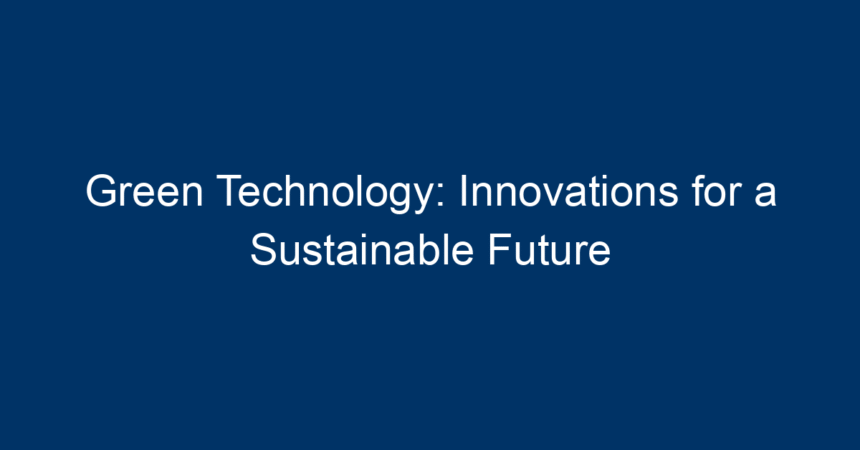In a world increasingly burdened by environmental challenges, green technology has emerged as a beacon of hope, innovating solutions aimed at sustainability and ecological preservation. As we grapple with issues like climate change, resource depletion, and pollution, green technology presents viable alternatives that promise a sustainable future. This article delves into the innovations within green technology, exploring how they are reshaping our relationship with the planet.
What is Green Technology?
Green technology, often referred to as sustainable technology, encompasses tools, techniques, and processes designed to reduce environmental impact. It integrates various fields—such as renewable energy, waste management, and sustainable agriculture—with the goal of fostering a healthier planet. By investing in green technology, societies can innovate in ways that drive economic growth while protecting natural resources and ecosystems.
The Role of Renewable Energy
One of the most significant facets of green technology is the development of renewable energy sources. Unlike fossil fuels, renewable energy is abundant and leads to fewer greenhouse gas emissions. Here are some notable innovations:
Solar Power
Solar energy harnesses the power of the sun through photovoltaic cells and solar panels. Innovations in solar technology, such as bifacial solar panels, increase energy generation by capturing sunlight from both sides. With the declining cost of solar installations, this technology is becoming accessible to households and businesses alike, paving the way for energy independence.
Wind Energy
Wind turbines are crucial for generating renewable energy, and advancements in turbine design are maximizing efficiency. Innovations such as vertical-axis wind turbines and offshore wind farms capitalize on higher wind speeds and reduce environmental disruption, making wind energy a key component of the global energy transition.
Biomass and Biofuels
Biomass energy utilizes organic materials to produce heat or electricity, while biofuels like ethanol and biodiesel are made from plant materials. These technologies help in reducing waste and contributing to a circular economy. Innovations in this field include enhanced fermentation techniques and genetic engineering of plants to increase yield.
Sustainable Agriculture
Green technology is also making strides in sustainable agriculture, which is crucial for food security and environmental health. Here’s how:
Precision Farming
Precision farming employs technology like GPS and IoT (Internet of Things) devices to optimize crop yields. Farmers can monitor soil health, weather patterns, and water usage in real time, leading to more efficient resource management and reduced waste. This not only increases productivity but also minimizes the ecological footprint of farming practices.
Vertical Farming
Urban areas face space constraints, making traditional agriculture challenging. Vertical farming addresses this issue by growing crops in stacked layers. Utilizing hydroponics and aeroponics, these farms use significantly less water and land, offering a sustainable solution to feeding growing urban populations.
Eco-Friendly Transportation
Transportation is another critical area where green technology is making headway. The shift towards sustainable mobility can significantly reduce carbon footprints.
Electric Vehicles (EVs)
The adoption of electric vehicles is rapidly gaining traction. EVs run on renewable energy and produce zero tailpipe emissions. Innovations in battery technology, such as solid-state batteries, promise longer ranges and faster charging times, making EVs more appealing to consumers. Moreover, the expansion of charging infrastructure supports this transition toward cleaner transportation.
Public Transport Innovations
Modern public transport systems are also embracing green technology. Electrification of public transit vehicles, use of renewable energy in transit operations, and the introduction of smart traffic management systems reduce congestion and emissions, promoting more sustainable urban transportation.
Waste Management Solutions
Effective waste management is essential for achieving sustainability, and green technology offers innovative solutions to tackle this challenge.
Recycling Technologies
Modern recycling technologies, such as automated sorting systems and advanced material recovery facilities, enhance efficiency in recycling operations. Innovations in biodegradable materials mean less plastic waste and improved waste management practices.
Waste-to-Energy Conversion
The waste-to-energy process transforms non-recyclable waste into usable energy. This technology reduces landfill waste and generates renewable energy, contributing to a circular economy. Innovations in this space simplify the conversion processes, making them more economically viable and environmentally friendly.
Water Conservation and Management
Water is a vital resource, and green technology aims to optimize its use and reduce waste.
Smart Water Management Systems
These systems utilize IoT devices to monitor water usage in real time, detect leaks, and optimize distribution. By conserving water and minimizing waste, cities can ensure a sustainable supply for future generations.
Advanced Water Purification
Innovative water purification technologies, such as solar-powered desalination and bio-inspired filtration methods, make clean water more accessible. These methods significantly reduce the environmental impact of traditional purification processes while meeting the growing demand for freshwater.
The Impact on Society and Economy
Green technology carries profound implications for both society and the economy. By fostering job creation in renewable energy sectors and promoting green jobs, it supports economic growth. Moreover, the societal shift towards sustainability encourages community engagement and raises awareness about environmental stewardship.
Conclusion: Taking Action for a Sustainable Future
The innovations in green technology present an exciting frontier for a sustainable future. However, the responsibility lies with individuals, businesses, and governments to embrace these advancements and integrate them into daily practices.
Actionable Insights for Individuals and Businesses
-
Adopt Renewable Energy: Consider installing solar panels or subscribing to green energy programs offered by your utility provider.
-
Support Sustainable Agriculture: Choose locally-sourced, organic products to promote sustainable farming practices and reduce your carbon footprint.
-
Embrace Electric Vehicles: If you’re considering a new vehicle, look into electric or hybrid options.
-
Reduce, Reuse, Recycle: Practice responsible waste management by reducing single-use plastics, reusing items, and recycling properly.
-
Engage in Community Initiatives: Participate in local sustainability efforts, such as community gardens or clean-up events.
- Educate Others: Share knowledge about green technology and its benefits with friends and family to foster a community culture of sustainability.
The future hinges on our ability to innovate and adopt green technology. By taking small, concerted steps, we can collectively forge a path towards a healthier, more sustainable world. Let’s embrace the innovations that promise a more eco-friendly future, realizing that every action counts in this vital endeavor.




